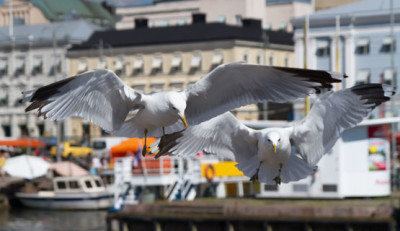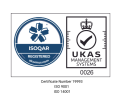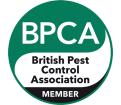
Call 0333 567 2020 for advice and quotes or contact us online
Effective Bird Control Methods in Dorset - Protecting the Natural Beauty of the County
Dorset is a beautiful county, home to diverse bird species that inhabit the beaches, forests, and parklands of the region. While many birds are a joy to behold, certain species can cause significant problems for residents, businesses, and the environment. Bird infestations can lead to structural damage, health risks, and other issues. Effective bird control methods in Dorset are essential to maintain public health, preserve the region's natural beauty and protect infrastructure.
 Types of Birds in Dorset that Cause Problems
Types of Birds in Dorset that Cause Problems
Birds such as gulls, pigeons, and starlings are the most problematic birds in Dorset. Their growing populations and prolific breeding habits mean that they're becoming more common in the area. These birds can cause multiple issues, including property damage, noise pollution, and disease. Gulls, for example, can create significant problems when they nest on roofs or other structures. Their aggressive behaviour, noise and droppings pose a threat to public health, and they can also damage roofs, electrical equipment, and AC units.
Methods of Bird Control
Various bird control methods can be used in Dorset, depending on the type of birds involved and the extent of the infestation. Effective control methods include:
- Bird Netting, one of the most versatile and widely used bird control methods. Bird netting creates a physical barrier to prevent birds from nesting or roosting on structures. Available in different materials, sizes, and colours, bird netting is suitable for various applications, including balconies, rooftops, and large areas.
- Bird Spikes, physical devices that prevent birds from landing or roosting on structures. Bird spikes can be made from metal, plastic, or other materials, and they work by creating an uncomfortable or unstable landing surface. Spikes are humane, effective, and straightforward to install.
- Bird Wire Systems, involve the use of steel springs and wires fixed between pillars or structures. By creating an unstable landing space, bird wire systems discourage pest birds from roosting or nesting. This method is particularly useful for buildings and structures in Dorset.
- Bird deterrents, such as bird repellent gel and Hawking, can also be employed to deter birds from unwanted areas. Bird repellent gel gives off ultraviolet light that appears as flames to birds, making them perceive it as a threat and move away. Hawking involves the flying of birds of prey in an area where pest birds are a problem to scare them off. This method is often used in large areas where physical barriers can't be installed.
Successful Bird Control Project in Dorset
One example of a successful bird control project in Dorset is the control of gulls in Weymouth Harbour using an intensive gull scaring programme. With a combination of flying a Harris Hawk in areas where the gulls were not nesting and Hawk patrols on the glove of its handler in areas they were nesting, gulls were successfully discouraged from roosting in Weymouth Harbour.
Potential Concerns and Drawbacks of Bird Control
While bird control methods are humane and effective, they can still pose challenges in some situations. For example, some methods, such as bird spikes and netting, may disturb non-targeted birds or local wildlife. Additionally, birds are smart creatures with good memories, and they may eventually become accustomed to particular deterrents. It's crucial to consult a licensed bird control professional before implementing any bird control methods.
Effective bird control methods are necessary to protect public health, infrastructure, and the environment in Dorset. By employing humane, effective, and appropriate bird control methods, we can mitigate bird-related issues in the region and maintain the natural beauty of the county. If you are looking for effective and humane bird control solutions in Dorset, our expert team can help. Our Dorset bird control team are specialists at dealing with pest birds.
For further advice and information on any type of pest control, or to book an initial survey in Dorset, call us on 0333 567 2020, or contact us today.
Author: NBC Environment/Orkin























